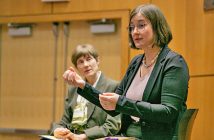Avery Cardinal Dulles, S.J., called Pope Benedict XVI a leader who maintains a great sense of the continuity of tradition within the Catholic church and its original teachings, and who seeks to “preserve and apply” those teachings through his papal role, at a lecture on the “Ecclesiology of Pope Benedict XVI,” held June 2, on the Rose Hill campus.

Avery Cardinal Dulles, S.J. Photo by Chris Taggart
Cardinal Dulles said that Pope Benedict XVI views the church as universal, deriving its spiritual authority, or essence, from Christ’s ascension and the original 12 disciples.
“[Pope Benedict XIV believes] the church is not a product of human creativity,” Cardinal Dulles said, “She does not become whatever the leaders and members wish to make of her. The church is prior to all human initiative. Ours is not to innovate, but to preserve and apply the church teachings.”
Cardinal Dulles, who met then Cardinal Ratzinger in 1971 and who has since exchanged writings with him, said that in the last 20 years, the Pope’s view on Vatican II reforms, such as decentralization of the church, has “matured.” Today, the Pope has a “full-orbed” vision of the church derived from the models of People of God, Mystical Body, Sacrament and Communion.
On the question of church and state, Cardinal Dulles said that the Pope comes “surprisingly close” to endorsing the American principle of separation of the two bodies.
“He does not want the [Catholic] church involved in politics,” he said. “The church depends on the state to keep justice. Consequently, the state cannot inculcate moral training, but depends on religious conviction, which makes people moral and respectful of one another. The church and state complement each other.”
Cardinal Dulles’ talk was part of a lecture series, Food For The Mind, sponsored by the Office of Alumni Affairs at Fordham’s Jubilee reunion, held June 1 through 3 on the Rose Hill campus.


